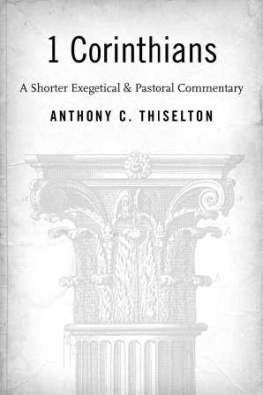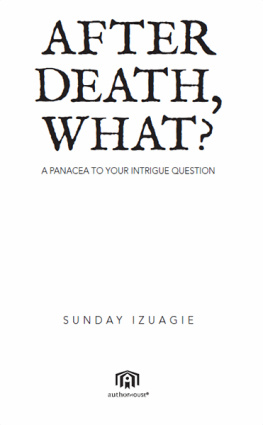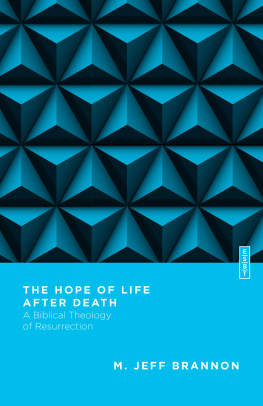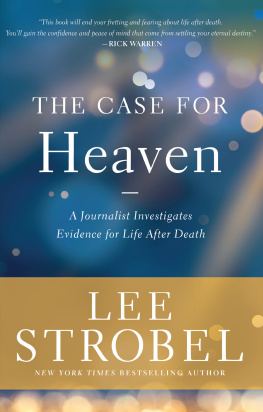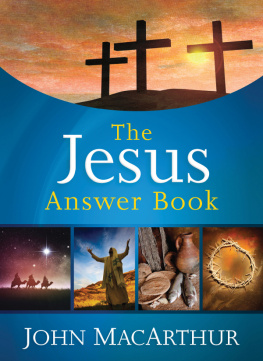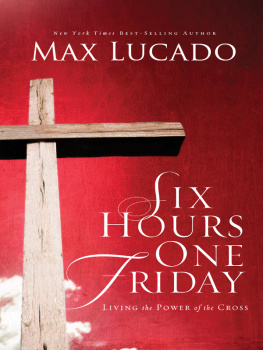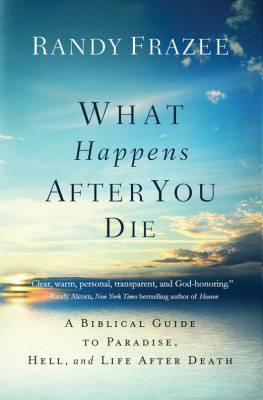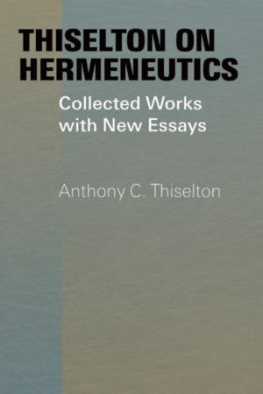In our time the doctrine of the last things has become more and more problematical for many people, and the idea of a life after death has lost the obvious plausibility it had in previous centuries. In this book Anthony Thiselton provides a comprehensive and illuminating discussion of biblical views on these issues. Thiselton skillfully employs philosophical analysis in the service of expounding biblical texts. This book illuminates these issues in a masterly and perceptive way and provides many new and helpful insights. I warmly recommend it.
VINCENT BRMMER
Utrecht University
Despite the eschatological turn in much of twentieth-century theology, too little attention has been dedicated to the actual content of the last things in recent literature. As a leading New Testament scholar and theologian acquainted with all of the problems and pitfalls in this area of study, Anthony Thiselton is admirably equipped to tackle this subject. This comprehensive and accessible work will become an important point of reference not only for scholars and teachers but also for those ministering to the dying and the bereaved.
DAVID FERGUSSON
University of Edinburgh
LIFE AFTER DEATH
A New Approach to the Last Things
Anthony C. Thiselton
WILLIAM B. EERDMANS PUBLISHING COMPANY
GRAND RAPIDS, MICHIGAN / CAMBRIDGE, U.K.
2012 Anthony C. Thiselton
All rights reserved
Published 2012 by
Wm. B. Eerdmans Publishing Co.
2140 Oak Industrial Drive N.E., Grand Rapids, Michigan 49505 /
P.O. Box 163, Cambridge CB3 9PU U.K.
18 17 16 15 14 13 12 7 6 5 4 3 2 1
Library of Congress Cataloging-in-Publication Data
Thiselton, Anthony C.
Life after death: a new approach to the last things / Anthony C. Thiselton.
p. cm.
Includes bibliographical references (p. ) and indexes.
ISBN 978-0-8028-6665-3 (pbk.: alk. paper)
ISBN 978-1-4674-3631-1 (mobi)
1. Eschatology. I. Title.
BT821.3.T45 2012
236 dc23
2011018127
www.eerdmans.com
Contents
I owe sincere thanks in many directions for the publication of this book, which reflects my practical concern for this subject. However, two people deserve special thanks. My wife, Rosemary, has once again corrected all the proofs, as well as helping in other ways. My secretary, Mrs. Karen Woodward, has typed the entire manuscript with efficiency, speed, and patience, while also preparing lecture outlines and fulfilling other University duties. In addition to these two, Mr. Milton Essenburg has brilliantly edited the typescript, and I am grateful to him, Mr. Jon Pott, Ms. Linda Bieze, among others at Eerdmans, for seeing another book through the press.
ANTHONY C. THISELTON, FBA
Emeritus Professor of Christian Theology
University of Nottingham, U.K.
AB | Anchor Bible |
ANF | Ante-Nicene Fathers |
AV | Authorized Version |
BDAG | W. Bauer, F. W. Danker, W. F. Arndt, and F. W. Gingrich, A Greek-English Lexicon of the New Testament and Other Early Christian Literature, 3rd edn. 2000 |
ConBNT | Coniectanea Biblica Neotestamentica |
EDNT | Exegetical Dictionary of the New Testament |
FC | Fathers of the Church |
FRLANT | Forschungen zur Religion und Literatur, des Alten und Neuen Testaments |
HTR | Harvard Theological Review |
ICC | International Critical Commentary |
JETS | Journal of the Evangelical Theological Society |
JSJSup | Supplements to the Journal for the Study of Judaism |
JSNTSup | Supplements to the Journal for the Study of the New Testament |
JTS | Journal of Theological Studies |
LCC | Library of Christian Classics |
LW | Luthers Works |
NEB | New English Bible |
NICNT | New International Commentary on the New Testament |
NIDOTTE | New International Dictionary of Old Testament Theology and Exegesis |
NIGTC | New International Greek Testament Commentary |
NIV | New International Version |
NJB | New Jewish Bible |
NovTSup | Supplement to Novum Testamentum |
NPNF | Nicene and Post-Nicene Fathers |
NRSV | New Revised Standard Version |
NTS | New Testament Studies |
REB | Revised English Bible |
SJT | Scottish Journal of Theology |
SNTSMS | Society for New Testament Studies Monograph Series |
TDNT | Theological Dictionary of the New Testament |
TDOT | Theological Dictionary of the Old Testament |
WBC | Word Biblical Commentary |
WTJ | Westminster Theological Journal |
WUNT | Wissenschaftliche Untersuchungen zum Neuen Testament |
I very much hope that pastors and churchgoers, as well as scholars, teachers, and seminary students, will benefit from this book. I have signposted three or four more technical clusters of two or three pages, which the non-specialist reader may prefer to omit. However, I hope no less that scholars and teachers will read this work, not least because a number of features and arguments are genuinely new and distinctive. About half of the chapters include logical clarifications of biblical problems, which may at first seem philosophical but have been included, not to draw on philosophical arguments to impose them onto the Bible but entirely to solve certain supposed contradictions or paradoxes which often perplex many ordinary readers.
These following twelve chapters vary greatly in their degree of novelty. Hence this Introduction offers the opportunity to survey what is new in each chapter, one by one, and to survey the arguments of each in advance of reading this book.
Chapter 1 was not originally part of this book, and was the last chapter to be written. This is because the interest of the New Testament writers concerning the Last Things relates not primarily to individual death or to individual survival after death, but to the great last acts of God, namely, the Return of Christ in glory, the resurrection of the dead, and the Last Judgment. Yet in the end there seemed insufficient reason to omit what remains a pressing concern for so many, including the writer. Many tell me that clergy are often nervous or ill prepared to speak on this subject. This may perhaps constitute the least original chapter of the twelve. It owes something to Jrgen Moltmann on mourning and death, and to Wolfhart Pannenberg on wholeness of meaning.
Chapter 2 concerns the basis for a reverent but confident belief in the resurrection of the dead, although resurrection is discussed more directly in Chapters 7 and 8. Chapter 2 remains especially relevant to those who hold doubts about any kind of Christian hope in life after death. Such doubt is not limited to those outside the Church. Only exceptional Christians never experience even the faintest doubt about what lies beyond death. Our hope and confidence cannot be based on the capacities of human beings to survive death and to become immortal. Such confidence depends entirely on
Next page

